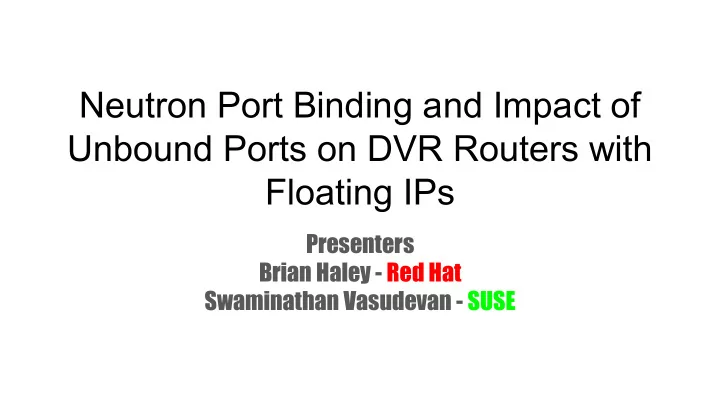

Neutron Port Binding and Impact of Unbound Ports on DVR Routers with Floating IPs Presenters Brian Haley - Red Hat Swaminathan Vasudevan - SUSE
Agenda Introduction Proposed Approach to handle the ➢ ➢ Neutron Port Binding Unbound ports for DVR ➢ DVR Router scheduling Design considerations for ➢ ➢ Handling Floating IPs with DVR unbound ports with FIP ➢ DVR Limitation on Unbound ports Future plans for scheduler change ➢ ➢ (Current issues with Octavia and for Floating IPs with DVR VRRP use case)
Bug 1583694 https://bugs.launchpad.net/neutron/+bug/1583694 DVR support for Allowed_address_pair port that is bound to multiple ACTIVE VM ports
Centralized Virtual Router (CVR) Compute Node 1 Compute Node2 Network Node VM1 VM2 VM3 VM4 br-int br-int br-int qrouter br-ex br-tun br-tun br-tun Private_net Public_net
Distributed Virtual Router (DVR)
Floating IP ● How to access an instance from a public network ○ DNAT from public IP to private fixed IP address ● With Centralized Routers, floating IPs are configured on the network node ● With Distributed Routers, they are configured on the compute node ○ Direct access to the external network Modifying port association is much different between the two!
Allowed Address Pairs ● Allowed address pairs is a port attribute extension that allows an arbitrary MAC address/IP address pair to pass through a port regardless of the subnet associated with the network ● Needed because by default neutron ports only allow traffic through that matches the MAC address and fixed-IP fields on a port (which is done to enforce anti-spoofing)
Virtual Router Redundancy Protocol ● The Virtual Router Redundancy Protocol (VRRP) is a computer networking protocol that provides for automatic assignment of available Internet Protocol (IP) routers to participating hosts 1 ● VRRP works by having hosts participate in a group which share a configured virtual IP address. One node is elected master and is the only node that will respond on that given address. The other nodes are slaves and just monitor the current master node periodically to ensure that it is still running. 1. https://en.wikipedia.org/wiki/Virtual_Router_Redundancy_Protocol
Neutron Port Binding Port Binding ● ML2 Port Binding for Legacy Routers. ● ML2 Port Binding for DVR Routers Port Binding attributes ● device_owner ● binding:hostid
DVR Router Scheduling ● DVR Routers are always scheduled to the ‘dvr_snat’ agents. (Network node) ● Update (router_update) notifications (Create/Update and Delete) are sent to the hosts that have valid dvr service ports based on host binding.
DVR Scheduling Neutron Neutron Network Compute Compute server scheduler Node Node 1 Node 2 Create router Add interface Router update Schedules Router to Network node If valid service port and host binding, Notify_host to create routers Sync_data If valid service port and host binding, Notify_host to create routers FloatingIP Router update If valid service port and host binding,Notify_host to create routers
DVR Limitation on Unbound Ports ● DVR routers have a tight dependency on ports host binding to be scheduled in compute hosts. ● Unbound Ports are untouched or unscheduled by DVR routers ● VRRP ports or the Allowed-address-pair ports are not bound to any permanent host. ● When Floating IP’s are configured on an unbound port, in the case of a VRRP port or Allowed-address-pair port, it is untouched by the agent, since the server does not send a notification message to the agents.
Handling Floating IPs with DVR ● Floating IPs are host bound and created when required ● Floating IPs are implemented in the shared FIP Namespaces ● Floating IPs require an agent gateway port on every compute node ● Floating IPs are also created on the SNAT node’s FIP Namespace if nova-compute is enabled on SNAT node ( Unique test only case).
Handling Floating IPs with DVR
Handling Floating IPs with DVR
Design considerations for centralized vs distributing the unbound port (VRRP/Allowed-address-pair) Floating IPs Distributed Model: ● Slow failover ○ Compute Node -> Compute Node teardown/setup takes time. ● Router namespace should receive the ARP update for the VRRP port ● ARP poll for the IP in the router-namespace. ● Trigger the GARP for the floating IP from the current host. ○ Lost gratuitous ARP can cause packet loss. Centralized Model: Fast failover, reliable, uses existing gateway port and no single point of failure or packet loss. Can take advantage of the DVR SNAT high availability.
Proposed Approach to Handle Unbound Ports with DVR ● Unbound Floating IP ports are to be scheduled to Network Node ● Floating IP (DNAT) rules for unbound VRRP ports are to be deployed in SNAT Namespace at the Network Node ● The Floating IP for unbound VRRP ports utilizes the ‘qg-interface’ and there is no need for the ‘fg-interface’ similar to the compute hosts. ● Current patch under review: ● https://review.openstack.org/#/c/437970/ (Server side patch) ● https://review.openstack.org/#/c/437986/ (Agent side patch) ●
DVR Scheduling for unbound ports Neutron Neutron Network Compute Compute server scheduler Node Node 1 Node 2 Create router Add interface Router update Schedules Router to Network node FloatingIP Router update If unbound port and device owner is lbaas or ‘None’ then notify snat_node to create floatingip On get_sync_data, reply with the flag set to ‘snat_bound’
Proposed Approach to Handle the Unbound Ports with DVR Allowed-Address-pair / VRRP IP Network Node Compute Node Compute Node VM1 VM2 VM3 VM4 br-int br-int br-int VR VR VR FloatingIP SNAT br-ex br-tun br-ex br-tun br-ex br-tun Private_net Public_net
Network Node Namespace change for VRRP FIP Network Node (‘dvr_snat’) br-int sg-interface qr-interface qr-interface VRRP DNAT SNAT IP DNAT SNAT qg-interface qg-interface br-ex
Network Node Namespace with unbound port FIP and bound port FIP Network Node (‘dvr_snat’) br-int sg-interface qr-interface qr-interface DNAT rfp-interface VRRP DNAT SNAT IP fpr-interface DNAT SNAT qg-interface fg-interface qg-interface br-ex
Future plans for scheduling the FIP (bound ports and unbound ports) ● Unbound ports always end up on the Network Node. ● Bound ports with Floating IPs can be distributed or centralized based on a config option or possibly API-based. ● https://bugs.launchpad.net/neutron/+bug/1667877 (RFE)
Thank You and Questions
Recommend
More recommend